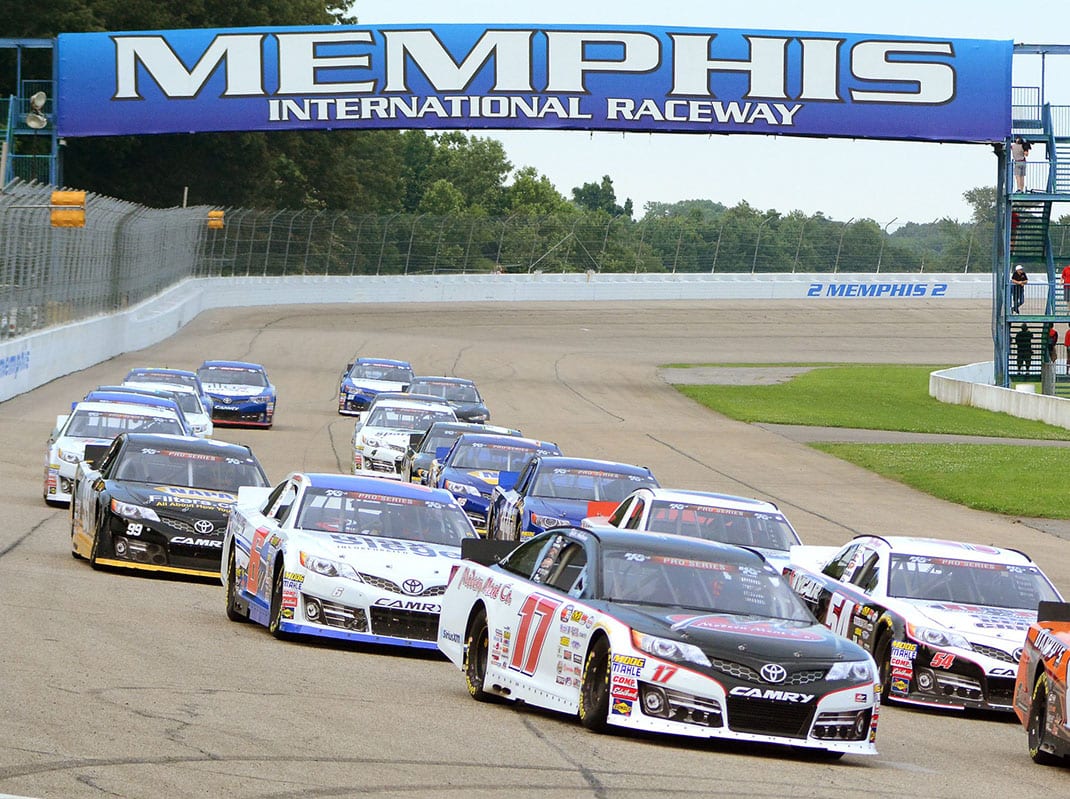That racing also includes the track’s adjacent IHRA-sanctioned drag strip and its 1.8-mile road course, which hosts selected sports car events.
“The drag strip and the bracket racing events that it holds are already a really solid program,” Packman noted. “Our Super Chevy show is always the monster event for the drag strip, but our bread and butter is the 10 bracket shows we put on each year for those core racers that support us through the year.
“We had a test-and-tune session to open the year that drew 110 cars and 200-plus spectators and it was put together on a Thursday, but the fans still left going, ‘Memphis has it going on.’ That’s what we want.”
While to some Packman may seem to be revolutionizing a facility that appeared to be on life-support for several years, he’s taking a road he’s used before.

“I’m taking the same approach at Memphis as I did at Lancaster. First of all, you have to stabilize your foundation, and when you realize that you’ve done that and done some events successfully, then you can ask yourself what you can add and do additionally in the future,” Packman explained. “When I started at Lancaster, I put together a rules package and did what we said we were going to do by making some of the shows more streamlined, and then by the end of the first year I reached out to ISMA and a few other big sanctions and got some big events added back to the calendar up there.
“Our goal was to take the events that were at Lancaster and make them bigger and we did that. Here at Memphis, we want to take races where maybe the track was just having events to have them … and turn our focus to bigger rewards and heightened racer interest. That’s where my focus is now, on how we can do that here.”
Big events require backing from sponsors.
“Much of our success is because of the great base of sponsors we have, and the fact we are adding new ones already this year bodes well for the community’s belief in what the track is doing,” said Packman.
Arguably the biggest event left to bring back to Memphis’ calendar — and one that has already been heavily talked about by fans and community members alike — is a NASCAR national touring series date.
The NASCAR Gander Outdoors Truck Series is the division most-often brought up in those conversations, especially since NASCAR’s five-year sanction agreements with its race tracks are up at the end of the 2020 season.
When asked if that means Memphis is in prime position to chase a major-league NASCAR event once again, something that hasn’t happened at the track since 2009, Packman smiled knowingly.
“Let’s just say that we’ve already had talks,” he said. “Unequivocally, yes, my goal is to have a national series race back here at Memphis. It can’t be next year, but 2021 … yeah, there’s possibilities there.
“There’s a much stronger possibility of that happening than there was at this time last year, I’ll put it to you like that.”
Between the Truck Series and the Xfinity Series, 23 NASCAR national series races were run on Memphis’ three-quarter-mile oval between 1998 and 2009.
Hall of Famer Ron Hornaday Jr. leads the Truck Series win count with three victories, including the final two at the track. Meanwhile, future Hall of Famer Kevin Harvick is the only multiple winner in Xfinity Series history at Memphis, boasting a pair of trophies from the track.
When you combine those races with the past NHRA history at Memphis, it creates a detailed chapter of Mid-South racing lore.
Packman is hoping the years to come create the next chapter in the growing legacy of Memphis Int’l Raceway.
“I would love for this portion of Memphis Int’l Raceway’s history to become new pages in the racing history of this town,” noted Packman. “It’s right in the middle of the country. We’re right on the Mississippi River and draw from all over — St. Louis, Mississippi, Louisiana and even Arkansas.
“That’s a diverse pool of fans and we want them to all be talking about us going forward.”
